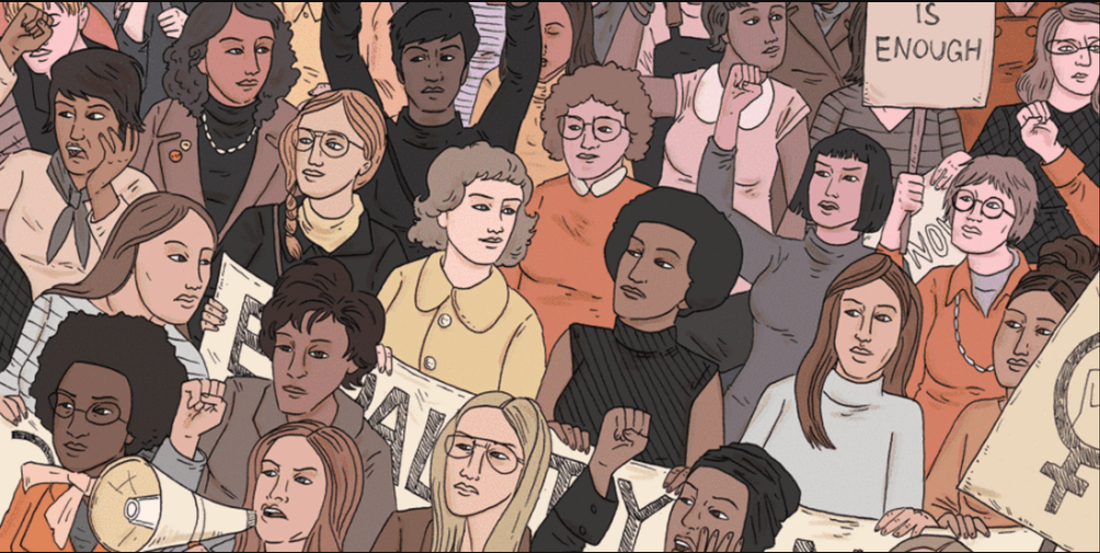|
By: Bonne Leung Feminism. As defined by Oxford Languages, feminism is “the advocacy of women's rights on the ground of the equality of the sexes”. But, what comes to mind when you hear this term? Perhaps all the “Girl Power!” stickers you’ve ever seen decorating a girl’s belongings, or the explosion of hashtags beneath a group of skinny, golden-haired girls’ Instagram posts? It should be noted that the definition provided by a simple Google search was written by two men. It should also be noted that the original term-- “féminisme”-- was coined by yet another man, Charles Fourier, in 1837. So you could say, as with most things, even a movement intended to empower women, is crawling with the musings and speculations of men. So, perhaps when you think of a feminist, your mind conjures up an image of a bra-burning woman, advocating the “Free the Nipple! ” prerogative, with unshaved arms raised above her head, and holding up a sign with ‘Down with the Patriarchy’ painted on it in pink. Or perhaps your mind conjures up a man with supple lips and soft features, obediently following behind his significant other in her crusade for female domination. There’s a sort of negative stigma surrounding the whole ordeal, where saying no when posed with the question “Are you a feminist?” can mean immediate scrutiny for being a woman-hater, but saying yes can mean you either hate all men or, if you’re a man, it means that you’re making some attempt to impress women. So really, it isn’t so much a war of genders as opposed to a war of ideologies. Some claim that the term has been twisted. It has never been about women taking over the world but about equality for everyone. As stated by Gloria Steinem, perhaps one of the most famous feminists in the world, stated, “a feminist is anyone who recognizes the equality and full humanity of women and men”. The only problem with the statement is the exclusion for those who identify with an identity that is outside the two binary genders, however, most feminists agree that the movement is striving not for a female-dominated society, but a society in which everyone has equal rights, regardless of race, age, gender identity, ethnicity, class or religion, or as it’s now called: intersectional feminism. What is Intersectional Feminism? As written by Medium, “Perhaps we should take a leaf out of feminism’s own book, and consider that an updated, gender-neutral term would reflect the inclusivity and true intentions of the movement — to banish gender inequalities of all forms, affecting all people.” It is not a war of genders, it’s a war for equal rights, for all. It’s essentially the idea that while all women are disadvantaged on account of on their sex, a black woman has both her race and gender against her, and a lesbian Latina woman has her sexuality, race, and gender against her. Intersectional Feminism is not a newly coined term that’s being thrown around because it’s trendy right now. It was first brought into the limelight by American law professor and activist Kimberle Crenshaw. But, it’s been a word used by feminists for decades, dating back to the 19th century, where activists like Anna J. Cooper used it to explain how the movement could be more inclusive and diverse. It’s the willingness to listen to different types of feminists, and first and foremost, understanding that there is not just one type of feminism. Why is it important right now? Just as intersectionality has risen to prominence, so has its diametrically opposed adversary: white feminism. No, it doesn’t mean that you’re a white feminist simply by virtue of being white. White feminism is the focus on the struggles of white women whilst ignoring or failing to address the other forms of oppression that women of ethnic minorities or other marginalized women face. To reiterate, just because you are white does not mean you are a white feminist. It’s only the acknowledgment that feminism can be white-washed and it very much exists as one of the main forms of the movement seen particularly in the media. It’s impossible to move any sort of activism forward if we don’t understand the very people we intend to empower and uplift. White feminism fails to do exactly what intersectional feminism strives to do. It selects a very specific and privileged group of women and romanticizes their struggles. This embellished, pumpkin spice latte-sipping movement is unfortunately more common than intersectionality. Intersectionality is important because it’s a movement that aims to involve everyone. It’s inclusive in its empowering of all female-identifying persons regardless of their circumstances and is a movement that people can identify with more solely because of its overarching theme of diversity. Of course, according to who you ask, you may receive a different definition of what feminism is, but at its core, it’s a push for a society with ameliorated equality. And no, it doesn’t only benefit women. There’s some weird misconception that women's rights are gained at the expense of men’s rights, but it’s honestly the opposite of the truth. It’s not just women who benefit from a more gender-equal society. Evidence shows that policies promoting gender equality improve the quality of life of everyone. From better sleep in Nordic countries where there are more gender-equal societies, to men saying they’re more satisfied with life when the sexes are more equal, there are plenty of studies to read that show that equal rights do not mean that one sex will be at a disadvantage when the other gains more rights. A more gender-equal society would also be beneficial as gender-roles would be less common, and the culture of toxic masculinity would also likely die away Wanna help? Hopefully, if anything, you’ve read until here and have become just a little more educated on the whole topic of feminism. By some miracle, maybe my writing has moved you to want to help. Now, I want to say I’m a feminist, and I do feel that I am, but there’s still a lot I don’t know that I still need to learn, but here are some resources for you, the very same ones that I used that resulted in hours of stalking and lurking. 1. Follow @feminism on Instagram One of the first accounts I followed, I love seeing their posts on my feed and they post pretty frequently. They don’t just post about feminism related topics but on a lot of different activism subjects too, so this account is a good one to stalk. There are plenty of other accounts that are pretty helpful on Twitter too. @EverydaySexism is an enraging and somewhat hilarious account where users tweet stupid or outright dumbfounding sexist things that have happened to them and tag the account. You can also type in the tag “feminism” or “activism” into Instagram and follow the hashtag, so relevant posts will show up on your feed. 2. Literature! Yes, the book nerd is showing, but it’s true. Classics may not always be the easiest reads but books like Jane Eyre, Little Women, and The Handmaid’s Tale are all great ways to understand what exactly feminism fights for. If you’re a fan of books, consider picking some of them up. Personally, I loved The Bloody Chamber by Angela Carter which are basically just a bunch of fairy tales with feminist twists. So, if you like a homicidal Little Red Riding Hood or a Sleeping Beauty that runs with the same crowd as the Cullens from Twilight, you’ll love this book. 3. Be ready to be educated. Maybe the most important of all, just be ready to learn. Just because you’re a woman doesn’t necessarily mean that you know all that there is to know. Recognize your privilege, if you have it, and learn from others. And just because you’re a man doesn’t necessarily mean you can’t be a feminist too, just listen to the women around you and be ready to relearn things that maybe you didn’t know before. So, to my guys, gals, and non-binary pals, just do your own research. Fall down rabbit holes! I’ve done that plenty, and it brings you to a lot of cool places where you can read about different peoples’ unique stories, hear and rage about stupid misogynous things people have actually said, and above all else, just be supportive. The future is intersectional
0 Comments
Leave a Reply. |



 RSS Feed
RSS Feed
